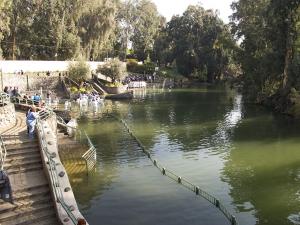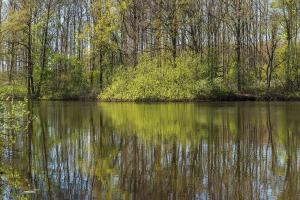 Having moved to Southern California in May of last year, I am even more acutely aware of the need for and the huge problem of water. We have lived here now for nearly 8 months, and during that time we have had exactly one day (1!) of measurable rain. I understand that we are now living in what is in effect a desert—with a wonderful profusion of flowering plants to enjoy—but a dearth of water is ominous, to say the least. Though we live a scant one mile from the world’s greatest ocean, containing water enough to drown the planet, that water is obviously unavailable for our use unless hugely expensive desalinization plants are thrown up in a hurry. Though I see enormous numbers of construction projects all around me, such plants are not among them. Hence, water is in short supply.
Having moved to Southern California in May of last year, I am even more acutely aware of the need for and the huge problem of water. We have lived here now for nearly 8 months, and during that time we have had exactly one day (1!) of measurable rain. I understand that we are now living in what is in effect a desert—with a wonderful profusion of flowering plants to enjoy—but a dearth of water is ominous, to say the least. Though we live a scant one mile from the world’s greatest ocean, containing water enough to drown the planet, that water is obviously unavailable for our use unless hugely expensive desalinization plants are thrown up in a hurry. Though I see enormous numbers of construction projects all around me, such plants are not among them. Hence, water is in short supply.
In another desert, some 6000 miles away and 2000 years ago, Jesus was baptized in the Jordan River by his cousin, the wild and crazy John. The site of that event was near Jerusalem, as narrated by the writers of the gospels, making the location rather more like a muddy creek than the experience of an actual river. The further the Jordan gets from the Sea of Galilee, the less it looks like a river at all, the final result being the Dead Sea.  Leave it to the modern Israelis to capitalize (in both senses of that word) on the western Christian hunger for a lovely spot of lushly treed river supposedly to mirror that ancient baptismal scene and manufacture a place they call Yardenit (Jordan Place?) just south of the Sea of Galilee. It bears no historical connection to the possible original site of the baptism whatever, but it sure looks fine! Excellent trees frame a gently flowing beautiful stream, dotted by multilingual people in white robes ready to dip the anxious pilgrims into the flow. I admit to judging the place as cleverly designed hucksterism, but I have witnessed many who have found it deeply moving. So I attempt to curb my cynicism if at all possible. But it is fair to say, no matter one’s view of Yardenit, that it is another sign of the importance of water.
Leave it to the modern Israelis to capitalize (in both senses of that word) on the western Christian hunger for a lovely spot of lushly treed river supposedly to mirror that ancient baptismal scene and manufacture a place they call Yardenit (Jordan Place?) just south of the Sea of Galilee. It bears no historical connection to the possible original site of the baptism whatever, but it sure looks fine! Excellent trees frame a gently flowing beautiful stream, dotted by multilingual people in white robes ready to dip the anxious pilgrims into the flow. I admit to judging the place as cleverly designed hucksterism, but I have witnessed many who have found it deeply moving. So I attempt to curb my cynicism if at all possible. But it is fair to say, no matter one’s view of Yardenit, that it is another sign of the importance of water.
Not far from Yardenit, another, less pleasant, sign of the power of water may be seen. The Israelis have created several roads of superior quality that pass through or near small Palestinian villages. The roads are only useable by those with Israeli license plates, hence no Palestinian can drive on them. One of the first of these restricted roads was laid directly under a poor Palestinian village. In order to create this particular highway, the Israelis had to tunnel through a small hill under the village. In the process, the cistern that the village uses for its water supply was cracked and rendered unusable. For months the village had to purchase water for its use from other villages while in a nearby Israeli settlement green lawns and swimming pools were kept in full operation. It takes little imagination to feel the anger in the village this scene elicits. And it takes a similar tiny imagination to wonder about future water wars that could erupt as the precious resource dwindles in places were it has always been scarce.
Those who study such matters warn that water wars are in our future. Already it has been suggested that the agonizing civil war in Syria, which grinds on into its seventh year, was at least in part the result of a lack of water. As farms in the rural countryside were no longer sustainable due to a lack of water, more and more poor folk poured into the larger cities, looking for work. As the cities swelled, their infrastructures were strained to the breaking point, and the natural enmity between competing religious and economic groups created flash points for conflicts that erupted all around. The horrors of 2017 Syria could easily find copies in other places. How water is allocated and used will be crucial in the years ahead.
“In beginning, God created the skies and the earth, the earth being a “formless void” (tohuwabohu in Hebrew, now an English word meaning “chaos”) with darkness covering the surface of tehom (the vast cosmic ocean), and a god-awful wind sweeping over the surface of the waters” (Gen.1:1-2). Thus begins the dramatic and unforgettable first act of God in the creation of all that is. It starts in water, the “deep,” a Hebrew word borrowed from the much more ancient story of the world’s creation from Babylon where the goddess Tiamat (a word whose consonants exactly match that of the Hebrew tehom), the great dragon of the salt water ocean, mates with Apsu, the less powerful god of the fresh waters of the rivers and inland seas, thus engendering all the lesser gods and goddesses that people their rich divine pantheon. Of course, in Genesis we are far from the rush hour of the many gods of Babylon, but water remains the central feature of all Middle Eastern creation accounts. This is hardly surprising given the topography of the lands that gave rise to the tales.
 The simple act of baptism, the dunking in or pouring over of water, is rooted quite deeply in these ancient stories of creation. And when we renew our baptisms, as many churches will do this week, we reiterate our connections to the creation of all things by the God we have come to worship. Just as our earth is over 70% water, so are we humans, and our baptisms remind us again of those inexorable facts. Water is one of God’s finest gifts to us, a resource we do well to use wisely, carefully, and share justly with our fellow humans.
The simple act of baptism, the dunking in or pouring over of water, is rooted quite deeply in these ancient stories of creation. And when we renew our baptisms, as many churches will do this week, we reiterate our connections to the creation of all things by the God we have come to worship. Just as our earth is over 70% water, so are we humans, and our baptisms remind us again of those inexorable facts. Water is one of God’s finest gifts to us, a resource we do well to use wisely, carefully, and share justly with our fellow humans.
The United Methodist service of Baptism is a well-wrought design that focuses squarely on water in the tradition, from creation to the grand event at the Sea of Reeds, to the passage over the Jordan into the land of promise to the return of the Babylonian exiles over that same Jordan to the baptism of Jesus of Nazareth. At every high moment of the story of Judaism and early Christianity water has played an enormous role. That role will only increase in the shrinking world in which we now live. So, “remember your baptism and be grateful” is far more than a liturgical phrase we shout once a year; it is nothing less than a stark reminder that water is life, both physical and spiritual, and we forget that fact to our infinite peril.











